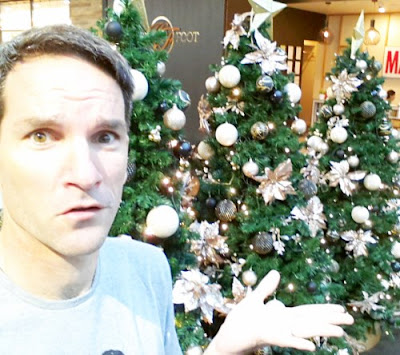How early is too early for Christmas trees? I was bemused to see these three at my local shopping centre - and a nativity scene just out-of-shot.
It was Monday 29 October, but I'm guessing they went up a few days earlier - before the weekend rush. Does your local shopping centre have decorations up yet? Let me know in the comments.
While the nativity scene depicts people worshipping baby Jesus, the intent is more about worship of sales figures. Later in the year, look out for news interviews with retail executives declaring this to be a "good Christmas" - but only if sales are more than last year. and significantly more.
Write down a list of the things that you enjoy about the Christmas season. Chances are it includes the Christmas movies, the Christmas music, spending time with loved ones and being on holidays. If you're Christian it might be more about Jesus. If you're in the Northern hemisphere it might also be making snowmen. Here in Australia it might be going to the beach or having a dip in the pool.
Do those things more. Do shopping less.
As far as possible, have less stress and insanity. Have more of the joy of Christmas.
It was Monday 29 October, but I'm guessing they went up a few days earlier - before the weekend rush. Does your local shopping centre have decorations up yet? Let me know in the comments.
Reli-gious?
I'd like to believe that the centre CEO or managing staff are just so full of the joy of Christmas, that they just couldn't wait to put out the Christmas decorations. But does anyone even have their home tree up yet?Or Really-just for money?
I can't help but think this is just a sneaky sales tactic. Decorations prompt shoppers to put something extra in their trolley "for Christmas". The longer decorations are up, the more action they get at the cash register.While the nativity scene depicts people worshipping baby Jesus, the intent is more about worship of sales figures. Later in the year, look out for news interviews with retail executives declaring this to be a "good Christmas" - but only if sales are more than last year. and significantly more.
What's wrong with this?
The problem is that it doesn't make us any happier. Buying extra stuff we don't need just leaves us with more clutter, more waste, more waist (if the stuff is food), more debt and more stress. Hardly a Merry Christmas!Write down a list of the things that you enjoy about the Christmas season. Chances are it includes the Christmas movies, the Christmas music, spending time with loved ones and being on holidays. If you're Christian it might be more about Jesus. If you're in the Northern hemisphere it might also be making snowmen. Here in Australia it might be going to the beach or having a dip in the pool.
Do those things more. Do shopping less.
As far as possible, have less stress and insanity. Have more of the joy of Christmas.



Comments
Post a Comment